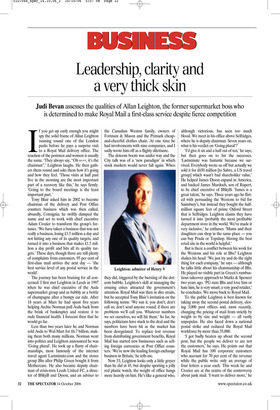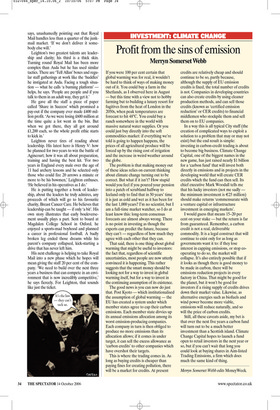Leadership, clarity and a very thick skin
Judi Bevan assesses the qualities of Allan Leighton, the former supermarket boss who is determined to make Royal Mail a first-class service despite fierce competition If you get up early enough you might spy the solid frame of Allan Leighton running round one of the London parks before he pays a surprise visit to a Royal Mail delivery office. The reaction of the postmen and women is usually the same. ‘They always say, “Oh s***, it’s the chairman”,’ Leighton laughs. He then gathers them round and asks them how it’s going and how they feel. ‘Those visits at half past five in the morning are the most important part of a recovery like this,’ he says firmly. ‘Going to the board meetings is the least important part.’ Tony Blair asked him in 2002 to become chairman of the delivery and Post Office counters business which was then called, absurdly, Consignia; he swiftly dumped the name and set to work with chief executive Adam Crozier to transform the group’s fortunes. ‘We have taken a business that was not really a business, losing £1.5 million a day and not hitting any one of its quality targets, and turned it into a business that makes £1.5 million a day profit and hits all its quality targets.’ These days, though there are still plenty of complaints from customers, 95 per cent of first-class mail arrives the next day — ‘the best service level of any postal service in the world’.
The journey has been bruising for all concerned. I first met Leighton in Leeds in 1997 when he was chief executive of the Asda supermarket group and as bubbly as a bottle of champagne after a bumpy car ride. After 18 years at Mars he had spent five years helping Archie Norman pull Asda back from the brink of bankruptcy and restore it to rude financial health. I forecast then that he would go far.
Less than two years later he and Norman sold Asda to Wal-Mart for £6.7 billion, making them both many millions. Norman went into politics and Leighton announced he was ‘Going plural’. He took up a flurry of chairmanships, most famously of the internet travel agent Lastminute.com and the stores group Bhs after Philip Green bought it from Mothercare. He also became deputy chairman of crisis-torn Leeds United FC, a director of BSkyB and Dyson, and an adviser to the Canadian Weston family, owners of Fortnum & Mason and the Primark cheapand-cheerful clothes chain. At one time he had involvements with nine companies, and I sadly wrote him off as a flighty dilettante.
The dotcom boom was under way and the City talk was of a ‘new paradigm’ in which stock markets would never fall again. When they did, triggered by the bursting of the dotcom bubble, Leighton’s skill at managing the ensuing crises attracted the government’s attention. Royal Mail was then in dire straits, but he accepted Tony Blair’s invitation on the following terms: ‘We run it, you don’t; don’t call us; don’t send anyone round; if there are problems we’ll call you. Whatever numbers we set ourselves, we will hit them.’ So far, he says, politicians have stuck to the deal and the numbers have been hit as the market has been deregulated. To replace lost revenue from distributing government benefits, Royal Mail has started new businesses such as selling foreign currencies at Post Office counters. ‘We’re now the leading foreign exchange business in Britain,’ he tells me.
Now 53, Leighton looks only a little greyer than he did at 45, but despite sporting a jolly red plastic watch, the weight of office hangs more heavily on him. He’s like a general who, although victorious, has seen too much blood. We meet in his office above Selfridges, where he is deputy chairman. Seven years on, what is his verdict on ‘Going plural’?
‘I’d give it six and a half out of ten,’ he says, but then goes on to list the successes. ‘Lastminute was fantastic because we survived. Everybody wrote us off but actually we sold it for £650 million [to Sabre, a US travel group] which wasn’t bad shareholder value.’ He helped James Dyson expand in America, and backed James Murdoch, son of Rupert, to be chief executive of BSkyB. ‘James is a great talent,’ he says. Three years ago he flirted with persuading the Westons to bid for Sainsbury’s, but instead they bought the halfmillion square feet of prime Oxford Street that is Selfridges. Leighton claims they have turned it into ‘probably the most profitable department store in the world. We’ve made it very inclusive,’ he enthuses. ‘Mums and their daughters can shop in the same place — you can buy Prada or Topshop. Having the best retail site in the world is helpful.’ But is there a conflict between his work for the Westons and his role at Bhs? Leighton shakes his head. ‘We just try and do the right thing for each company,’ he says — although he talks little about his chairmanship of Bhs. He played no visible part in Green’s rumbustious takeover approach to Marks & Spencer two years ago. ‘PG runs Bhs and love him or hate him, he is very smart; a very good retailer,’ he concludes. We move back to Royal Mail.
To the public Leighton is best known for taking away the second postal delivery, closing 3,000 post offices and, most recently, changing the pricing of mail from strictly by weight to by size and weight — all vastly unpopular. He also faced down a national postal strike and reduced the Royal Mail workforce by more than 35,000.
‘I got badly beaten up about the second post, but the people we deliver to are not the customers,’ he says. He points out that Royal Mail has 100 corporate customers who account for 70 per cent of the revenue while the public write only an average of four letters a year each. This week he and Crozier are at the centre of the controversy about junk mail. ‘I want to deliver more,’ he says, unashamedly pointing out that Royal Mail handles less than a quarter of the junkmail market. ‘If we don’t deliver it somebody else will.’ Leighton’s two greatest talents are leadership and clarity; his third is a thick skin. Turning round Royal Mail has been more complex than Asda but he has used similar tactics. There are ‘Tell Allan’ boxes and regular staff gatherings at work like the ‘huddles’ he instigated at Asda. Facing a tough situation — what he calls ‘a burning platform’ helps, he says. ‘People are people and if you talk to them in an adult way, they get it.’ He gave all the staff a piece of paper called ‘Share in Success’ which promised a pay-out if the company ever made £400 million profit. ‘As we were losing £600 million at the time quite a lot went in the bin. But when we got there, they all got around £1,200 each, so the whole profit ethic starts to kick in.’ Leighton never tires of reading about leadership. His latest hero is Henry V: how he planned for two years to win the battle of Agincourt; how it was all about preparation, training and having the best kit. ‘For two years in England every male over the age of 11 had archery lessons and he selected only those who could fire 20 arrows a minute or more to be his bowmen,’ Leighton enthuses. ‘He believed in his operatives as I do.’ He is putting together a book of leadership, about the leaders he truly admires, any proceeds of which will go to his favourite charity, Breast Cancer Care. He believes that leadership can be taught — if only ‘a bit’. His own story illustrates that early bouleversement usually plays a part. Sent to board at Magdalen College School in Oxford, he enjoyed a sports-mad boyhood and planned a career in professional football. A badly broken leg ended those dreams while his parent’s company collapsed, kick-starting a drive that has never left him.
His next challenge is helping to take Royal Mail into a new phase which he hopes will mean giving the staff 20 per cent of the company. ‘We need to build over the next three years a business that can compete in an environment that is now incredibly competitive,’ he says fiercely. For Leighton, that sounds like just the ticket.



































































































 Previous page
Previous page